Published monthly for CC employees by Clinical Center Communications
June 1998
New way to echo
MIS to improve
people
Health Fair
Nursing awards
Lux for life
News briefs
|
|
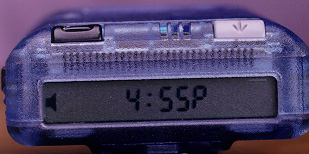
Silenced Beeps
As millions of pager customers lost service last month due to a satellite
problem, most CC staff suffered no interruption in their service thanks
to the in-house 104-pagers. The in-house pager system does not rely on the
$250 million satellite to relay messages. Unfortunately, numerous non-medical
staff who use paging companies from outside the CC had little or no service
for up to several days.
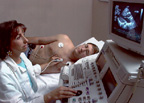 Joy Laurienzo, R.N., performs an echocardiogram on a patient. Echocardiograms
are painless, noninvasive tests that use soundwaves to identify abnormalities
of the heart muscle and valves. Laurienzo coordinates the NHLBI echocardiography
lab and is one of four registered-nurse sonographers who staff it. Joy Laurienzo, R.N., performs an echocardiogram on a patient. Echocardiograms
are painless, noninvasive tests that use soundwaves to identify abnormalities
of the heart muscle and valves. Laurienzo coordinates the NHLBI echocardiography
lab and is one of four registered-nurse sonographers who staff it.
New echocardiography procedures go into effect next
month
Beginning July 6, changes will take place in the way echocardiograms
(echoes) are scheduled and reported in the Clinical Center.
"All the echocardiography services for the hospital will now be
coordinated by the echocardiography laboratory of the NHLBI," according
to Dr. Julio Panza, lab director.
"Until now, the NHLBI echo lab was only responsible for the echocardiograms
in cardiology branch patients," said Dr. Panza. "Studies in all
other patients were performed by the Consult Service of the Clinical Center."
Now, all inpatients who need echoes will have them done in the 7-West
Echo Lab (7S252), which is undergoing minor renovations to accommodate the
increased usage. Outpatients will continue to have their echoes done in
the first-floor Heart Station (1C256), for convenience and proximity to
other outpatient services, such as electrocardiography and phlebotomy. Bedside
scans will continue to be performed as needed.
Two main changes are important to note:
- Echoes will be scheduled as either inpatient or outpatient based on
the patient's status at the time the test is needed, not his or her status
at the time the test is ordered. For example, if Mr. Smith is an inpatient
today, but his doctor wants him to have an echo in 2 weeks, after he's
been discharged, that test would be ordered as an "outpatient echo."
The patient would report to the first-floor Heart Station. (See box below
for scheduling phone numbers.)
- Written reports will be generated within 24 hours after completion
of the study, and the information will be retrievable through MIS. A copy
will go to the Medical Record Department.
For more information, call Joy Laurienzo, R.N., at 6-3015.
As of July 6, echocardiograms will be scheduled according
to the status of the patient at the time the test will be done.
- To schedule an outpatient echo, call 6-0516.
- To schedule an inpatient echo, call 5-6038.
These telephone numbers will also appear on the MIS orders screen. Physicians
can expect a written report within 24 hours of test completion. (by Sue Kendall)
index |
CC announces MIS improvements
Aimed at improving the system that houses patients' clinical information,
the CC has announced a major educational effort for the NIH community.
"We plan to evaluate a new hospital system that will take the place
of the current Medical Information System (MIS)," said Dr. Stephen
Rosenfeld, acting chief of the Information Systems Department (ISD).
The current system, which has been used in the CC since 1976, has proven
useful for order entry, but not so beneficial in other areas.
"Data retrieval with the MIS system is cumbersome, which makes
it difficult to support research, an obvious priority," said Dr. Rosenfeld.
"Many of the newer systems can provide that information, as well as
provide a much richer user interface, making them easier to use."
Several hands-on educational sessions, including displays and lectures
from numerous vendors, will be held throughout the summer. Planners stress
the importance of comments and suggestions from medical staff within all
of the Institutes.
"We don't want to start the process until everyone who sees patients
at the CC knows what they should be asking for in a final product,"
said Dr. Rosenfeld.
"What we need to learn from these sessions are the kinds of features
that people want to see included in our final proposal. That's why we need
to see what type of state-of-the-art technology other hospitals are using."
The project is being overseen by the information subcommittee of the
Medical Executive Committee. The ISD will be responsible for the installation
and upkeep of the system, targeted for installation in the new Clinical
Research Center.
If you have any system suggestions or comments, call Dr. Rosenfeld at
6-7946. (by LaTonya Kittles)
index |
People:
 CC award to be given in memory of Jesse Ferguson CC award to be given in memory of Jesse Ferguson
In preparation for the Clinical Center Awards ceremony to be held in
September, supervisors have been asked to recognize their deserving employees
by nominating them for an award. In addition to the traditional categories,
a special award will debut at this year's ceremony.
The Jesse Ferguson Customer Service Award will be given in honor and
memory of long-time Clinical Center employee, Jesse J. Ferguson. The award
will recognize the accomplishments of those who demonstrate outstanding
dedication and skill in the area of customer service.
Ferguson, who died last year only days before his planned retirement
from government service, served the Clinical Center since the start of his
federal career in 1961. His work began with the local-transportation section,
from where he climbed the career ladder, serving as chief of the patient
escort service, chief of the admissions section, clinic administrator, and
then deputy chief of the Outpatient Department.
As in the past, employees will also be recognized for their efforts and
skill in patient care, teaching/training, science, administration, and strategic
initiatives.
Recertified
Several critical care medicine physicians were recently successfully
recertified by the American Board of Internal Medicine.
"I think that most medical organizations feel it is an important
sign of quality to have a high percentage of their staff certified in the
subspecialty they practice," said Dr. Henry Masur, chief of the Critical
Care Medicine Department. "Recertification is an important benchmark
for quality."
Those physicians recertified include Drs. Robert Danner, Peter Eichacker,
Frederick Ognibene, James Shelhamer, and Anthony Suffredini. (Stories
by Bonnie Flock) |
|
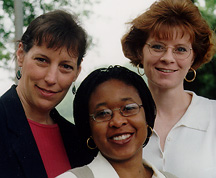 Staff cited Staff cited
Several Department of Transfusion Medicine (DTM) employees were recently
honored by the Mid-Atlantic Association of Blood Banks. (Above from left)
Jo Proctor received the Mary C. Doerr Meritorious Service Award for her
many contributions to transfusion medicine. Kimberly Keys was awarded for
submitting an essay, which was selected to receive the Exhibitor's Scholarship,
a grant to pay the expenses associated with attending the meeting for a
first-time participant. Melinda Langston received the Susan Wilkinson Education
Award for her research project, "Evaluation of the gel system for ABA
grouping and D-antigen typing."
The association, which serves the region for continuing professional
education in the medical, scientific, technical, and administrative aspects
of blood banking and transfusion medicine, handed out the awards during
their annual meeting.
 CC patients share their input CC patients share their input
The new Clinical Center Patient Advisory Group (PAG) met for the first
time in late April. Shown is Dr. Gallin addressing the group, which is tasked
with advising the CC management on issues relating to patient services.
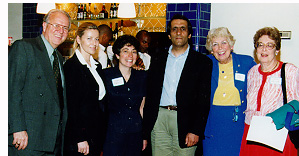
FOCC honors
The Friends of the Clinical Center (FOCC) recently thanked volunteers
for their continuing support during a dinner ceremony at Levante's, a local
restaurant. Founded in 1984, the FOCC is a private, nonprofit organization
that provides emergency financial aid to NIH patients and their families.
Shown are (left to right) Randy Schools, executive director of the NIH R&W
and board member of the FOCC; Dr. Anita Fuertes, restaurant co-owner; Maria
Stagnitto, FOCC president; Dr. Fuat Mehmetoglu, restaurant co-owner; and
Mary Maze and Sarah Kalser, FOCC volunteers.
index |
NIH Health Fair brings demonstrations, information,
and fun to the CC
Where can you find all of this--and more?
- Screenings for visual acuity, blood pressure and stroke risk, oral
and skin cancer, depression and anxiety.
- Demonstrations on how to access health information by computer.
- Fitness and Exercise 101.
- Relaxation techniques using therapeutic chairs.
- Displays of ergonomically designed office furniture.
- Tips for reducing risk of repetitive strain injuries in the laboratory.
- Health experts to answer your questions.
The NIH Health Fair.
This year's fair, "Good Health Begins Here," will be held
at the CC on June 16 and 17 in the main lobby and the Visitor Information
Center. Exhibits will be open Tuesday from noon to 5 p.m., and Wednesday
from 7:30 a.m. to 2 p.m.
"The NIH Health Fair gives employees an important opportunity to
learn the latest developments in maintaining our health and fitness, as
well as receive preventive screenings for various disorders," said
Dr. Harold Varmus, NIH director.
C.W. Metcalf, author of Lighten Up: Survival Skills for People Under
Pressure, will kick off the event with a presentation at 11 a.m. in Masur
Auditorium. Metcalf heads a Colorado-based training firm that specializes
in helping people and organizations thrive in environments of rapid change.
His volunteer work with pediatric cancer patients and his ongoing efforts
as a volunteer for hospice groups led to the development of his seminars.
Since 1983, he has presented to more than 200 government, corporate, educational
and health-care organizations.
Thirty-five booths will cover topics such as mental health, elder care,
safety, drug abuse, nutrition, exercise, ergonomics, and prevention and
control of common diseases. Here are some highlights:
- You can chart your own family tree and discuss findings with genetic
counselors.
- Discover the alcohol content of everyday household products.
- See how certain diseases and deformities look on Mr. Bones.
- Examine and manipulate hearing aids.
- Learn how you can donate blood to NIH patients.
- Find out what services NIH offers to help employees balance work and
family life.
Health screenings will be conducted on a first-come, first-served basis.
Consultations for skin cancer screenings are expected to fill up soon and
require an appointment. For more information, or to schedule an appointment,
call 2-3305.
The NIH Health Fair is an initiative of the Worksite Health Promotion
Committee. The fair is sponsored by the Office of Disease Prevention, in
cooperation with the Institutes, the R&W, and the FDA.
For sign language interpretation services visit booth #1 during the
health fair. For reasonable accommodations for persons with disabilities,
call James Hadley, event coordinator, at 5-6045. (by James
Hadley)
index

| 1998 director's award honors went to Dr. Carol Romano and the multidisciplinary
Pyxix Implementation Team (above.) Arleen Berman (right) was named nurse
of the year. |
|
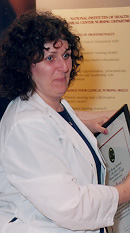 |
CC nurses honored
Clinical Center nurses were recognized during the Nursing Department's
Annual Meeting and Awards Ceremony held on May 5 in Lipsett Amphitheater.
Nurse of the year honors went to Arleen Berman from OP3, and the distinguished
nurse award was given to Donna Jo Mayo of the 2 West bone marrow transplant
unit. The nursing research award went to Patricia Smatlak, from the 10D
unit.
This year's director's award honors went to Dr. Carol Romano and the
multidisciplinary Pyxis Implementation Team, including: Daniel Keravich,
Priscilla Boykin, Linda Coe, Joyce Denoyer, Simon Eng, Susan Gantz, Gregory
Hinson, Timothy Maloney, Susan Martin, Marilyn Mouer, Nitin Patel, Rosalie
Smith, and Therese White.
Clinical excellence awards were given to Ann Hickey, Sandra Jones, and
Antoinette Jones-Wells.
Recognized for leadership excellence were Bernadette Childs, Donna Gwyer,
and Anthony Santucci.
Honored for excellence in administrative/clinical support were Louis
Gaeta, Michelle Gibson, Patrina Gregory, and Betty Peterson.
Receiving awards for excellence in teamwork were nursing staff from
3 East Adult, 3 East Child, 3 West, 4 East, 4 West, 8 East, and OP3 Dental
Research team.
Excellence in nursing/patient education was awarded to Robyn Lance,
Teresa Peduzzi, Sharon Quint-Kasner, Diane Thompkins, Ellen Polignano,
and the Rainbow Team Compliance Committee.
The 1998 chief's awards were given to Judie Johnson, Pamela Koviack,
Yoon Park, Diane Thompkins, and Terri Wakefield.
index |
Leisure: A Luxury for a Lifetime
|
Summer is fast approaching. As I think about summer I catch myself daydreaming
of spending hours relaxing under a big shady oak tree with a cool glass
of iced tea while engrossing in my favorite pastime. . . reading.
Leisure, I have found, provides significant pleasure in my life, but
often gets taken for granted.
Why is leisure so important? How does one carve more time for leisure
activities? Let's explore these two important questions.
Why is it so important? Keeps your life in sync
Think about someone you know who seems to have their life in sync. In
my experience, those I've admired spend regular time "re-creating."
They embrace those activities that bring joy, satisfaction, and meaning
into their life. One of my good friends is a mom and active business leader
in the health-care field. She frequently schedules afternoons when she
closes the door to her downtown Chicago office and slips away to a friend's
ranch just outside the city. Her eyes just sparkle when she talks about
putting on cowboy boots and jeans to spend a few hours horseback riding.
Reduces health care costs
According to the Academy of Leisure Sciences, recreation and leisure
activities may be one of the best methods for curbing our rising medical
costs. The U.S. Health Care Financing Administration projected the health-care
cost of $5,500 per citizen could be reduced significantly if more efforts
were placed on health and healthy living, than on treatment of illness.
Keeps your life on track
Americans have made being busy a synonym for being important. We carry
our cellular phones, laptop computers, and pagers everywhere we go. It's
no wonder we have trouble finding time to step back to see where we are
heading. Leisure opens up your mind to new possibilities and opens your
eyes to red flags that are causing you to get off track.
Where do I find it? Prioritize what's important
Regularly look at those things that are most important to you. If it
is family, what are you doing to provide valuable leisure time with your
family?
You may feel that preparing dinner together and playing with kids after
school is a priority. Taking advantage of technology may be one option.
By turning the ringer off, and turning on your answering machine, you'll
skip those telemarketing calls and be able to return to those non-urgent
tasks while the kids are sleeping. It's a matter of looking at what you
value and what alternatives you have for creating that type of lifestyle.
Schedule leisure time in your daily planner
Just as a financial advisor will encourage their client to look at saving
money as a regular bill that is automatically withdrawn from their checking
account, it is also true that leisure time needs to be automatically scheduled
in your calendar, or it just slips away.
If reading is an activity you enjoy, but the closest you get to reading
is when you stumble over your pile of books when getting in and out of
bed, I encourage you to schedule time, even if it is to read a chapter
a day. My best time is in the morning. I enjoy the quiet morning hour when
I can relax and read with few interruptions. We need to look at our schedules
and prioritize what is most important.
Know your productivity power
Knowing when you have peak energy periods will make you more productive.
Peak energy periods are those times in the day when you often have more
zest and feel ready to go! Some people wake up with more energy in the
morning but by afternoon they are challenged to stay awake.
Tackling those hardest activities during the time of day you work best
will make you more effective. With increased effectiveness you can increase
free time. For example, if you are a morning person, you may opt to take
on that growing stack of paperwork right when you get to work, thereby
freeing you up from staying late at the office.
Leisure can be a significant part of enjoying your life as long as you
do some planning and keep your commitment to making leisure a priority.
If you do this, leisure will be a luxury you can afford for a lifetime.
(By Michael P. Scott, president of Empowerment Unlimited,
Inc., an organization dedicated to assisting individuals maximize their
potential and organizations reach that next level of success. Please share
your comments and suggestions via e-mail to EUpower2u@aol.com and in return
you will receive a free copy of "7 Tips to Living a More Balanced,
Meaningful and Fun Life."index
|
News briefs:
Blood needed
Severe weather, colds, flu and other illnesses often affect the number
of blood donations. The NIH Blood Bank relies heavily on the commitment
and kindness of NIH employees to support the patients in the Clinical Center.
If you are interested in donating blood, please call 6-1048 to schedule
an appointment. The Blood Bank is located in room 1C713B and is open on
Mondays, Wednesdays, and Fridays from 7:30 a.m. to 3:30 p.m.; Tuesdays
from 7:30 a.m. to 12:30 p.m.; and Thursdays from 7:30 a.m. to 5:15 p.m.
Walk-ins are also welcome.
Training offered
The CC education and training section will offer "Planning for
Retirement," on June 24-25, 9:00 a.m. to 4:00 p.m., in the first floor
conference room at 6100 Executive Boulevard. The seminar will cover considerations
for planning a smooth transition into retirement. To register, call 6-1618.
Open season
Open season for the Thrift Savings Plan (TSP) will be held from May
15 through July 31, 1998. FERS employees hired before January 1, 1998,
as well as CSRS employees, have an opportunity to either change their current
election or make an initial election. For more information or to obtain
forms call human resources at 6-6924.
index
Editor:
LaTonya Kittles
Clinical
Center News, 6100 Executive Blvd., Suite 3C01, MSC 7511, National
Institutes of Health, Bethesda, Maryland 20892-7511. (301) 496-2563. Fax:
402-2984. Published monthly for CC employees by the Office of Clinical Center
Communications, Colleen Henrichsen, chief. News, articles ideas, calendar
events, letters, and photographs are welcome. Deadline for submission is
the second Monday of each month.
top
| cc home page | nih
home page | |
|

